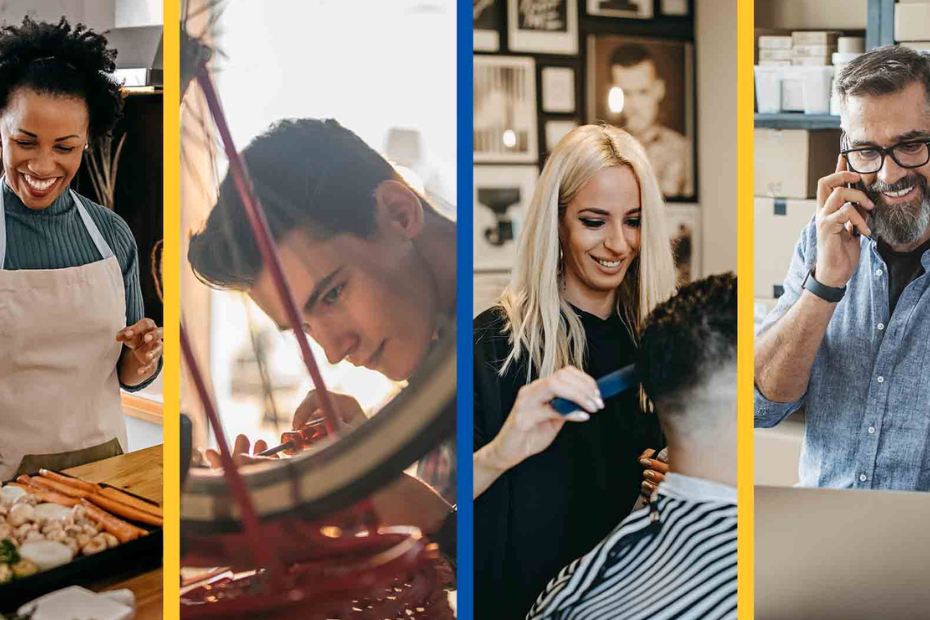“Building trust over Zoom isn’t easy,” admitted TechTO co-founder Alex Norman at the start of this month’s TechTO. But, he says, it’s not impossible. In fact, tech leaders’ ability to build relationships with customers, investors and staff over the past few months has been a testament to the ecosystem’s resilience.
At July’s virtual TechTO, five insiders shared their journey through the pandemic so far, as well as insights and lessons about persisting, innovating and raising.
Ryan Shupak on the need to think differently
Ryan Shupak co- founded Jiffy when he realized how hard it was to find professionals to do work around his home. Today, the company is touted as the easiest way to take care of small jobs around the home you need a pro for — such as gutter cleaning, AC repair, emergency electrical, etc.
While they have strong presence in three markets, they rely on continuous marketing to drive awareness. Unfortunately, one of their biggest channels was sports radio, which fell off with the pandemic. “How do you put money in radio when there is no rush hour?” asked Shupak during his discussion with TechTO co-founder Jason Goldlist. The team therefore shifted marketing efforts to locations where they could attract customers quickly and easily, and without as much investment.
Jiffy was also forced to take a lot of jobs off the table very quickly, given isolation mandates. They shifted their focus to outdoor jobs and were ready to go inside as soon as the country started unlocking.
“And we shifted from ‘growth at all costs’ to sustainable growth,” explained Shupak.
Donny Ouyang on the value of multiple investors
Donny Ouyang is the CEO of BlackCart — the first provider of try-before-you-buy technology to e-commerce.
While their initial B2C model was mildly successful (“ramen profitable”), it wasn’t scalable. They switched to a B2B model, which was more scalable, but they needed funds to get there.
BlackCart was therefore in the unique position to raise money during the pandemic. They started in early February and closed mid-April with a lead investor in L.A., participation from two other funds, and several angel investors.
When asked about the importance of multiple investors, Ouyang shared that this format offered a great deal of strategic value. “They provide access to networks and key introductions,” he said of the angels. Investors don’t just provide capital, he said, they also facilitate relationships and help open doors — having multiple people at the table can be a great benefit.
Andressa Lacerda on building towards a long-term goal
Andressa Lacerda and her co-founder at Synex Medical are developing non-invasive wearable health monitoring technology in a ring you wear on your finger. It’s the world’s first non-invasive way of measuring blood metabolites, which are indicators for diabetes, among other illnesses. Traditionally, metabolic testing must be done with a fingerpick — and even newer technologies still involve a needle. “Our goal is to get rid of the needle altogether,” said Lacerda.
Given the complex nature of their device — and the fact they want to shrink it so that it fits on a finger -— development is a long process. “We have an option to go to market with a larger device,” said Lacerda. “But our vision is to have a wearable ring.” It’s a vision that may take two to four years to realize.
So how does she get people (i.e., investors) excited given the long time to market?
“Lucky for us we have an awesome mission,” she said when asked during her chat with Goldlist. “We want to make healthcare proactive. People understand that very easily because everyone wants to make healthcare proactive — they want to know what’s happening with their body on a continuous basis.”
When COVID hit, people wanted to get rid of invasive methods even more, which propped up the Synex team. In terms of raising funds and demonstrating their competency for the project, Lacerda and her team held a small SAFE round last year. While terms were not as favourable for them, during the SAFE round the team did everything they said they would do. This gave them credibility and demonstrated the goals were realistic. “This approach is essential for a technically complicated product.”
Naheed Kurji on raising your next round
Naheed Kurji is Co-Founder and President of Cyclica, a company focused on applying Artificial Intelligence to drug discovery. Kurji explained how Cyclica is flipping problems on their head.
“The way in which medicines have traditionally been developed is to understand the disease first — the component that is malfunctioning. Then you design a drug for that component. The drug is a key and the component in your body is the lock.” While drugs are designed as keys, he says, in reality they interact with dozens to hundreds of locks in the body, which may lead to side effects.
At Cyclica, they are exploring of polypharmacology — how a drug does more than one thing. This notion has sparked innovation both with multi-national pharmaceutical companies and early-stage drug companies in Canada.
In June of this year, Cyclica announced their raise of a Series B round of $23 million. To date, they have raised a total of $38 million.
When asked about raising during COVID-19, Kurji explained that raising at any time isn’t much fun. “It’s very stressful, highly introspective and a lifelong journey,” he said. As such, it’s also a continuous endeavour, and as soon as the team closed their Series B, they began their Series C raise.
Kurji suggests continuously nurturing relationships in authentic ways. You need to form a network, get to know investors, reach out — all without an ask. Then when you’re ready to raise, the investors may just come to you.
The virtual TechTO closed with breakout sessions and networking. With hundreds of attendees online, it’s clear the ecosystem is thriving and driving. Perhaps now more than ever.
For more insights and lessons from founders and leaders who are always looking at how to turn a challenge into an opportunity, tune into the next TechTO event, available on a screen near you.
This article is intended as general information only and is not to be relied upon as constituting legal, financial or other professional advice. A professional advisor should be consulted regarding your specific situation. Information presented is believed to be factual and up-to-date but we do not guarantee its accuracy and it should not be regarded as a complete analysis of the subjects discussed. All expressions of opinion reflect the judgment of the authors as of the date of publication and are subject to change. No endorsement of any third parties or their advice, opinions, information, products or services is expressly given or implied by Royal Bank of Canada or any of its affiliates.



















